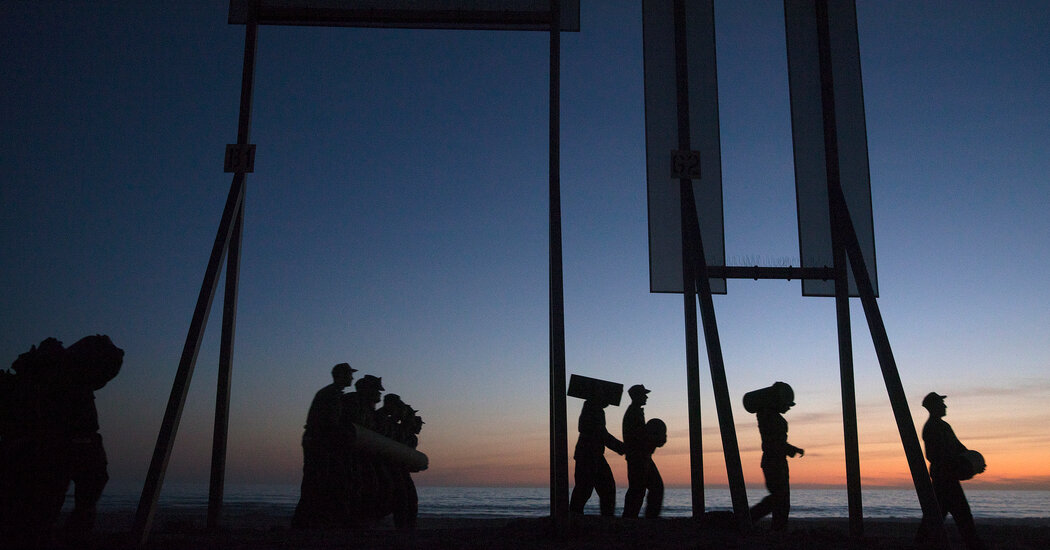For generations, the Navy SEALs have attracted top athletes who compete for slots on elite teams and take on harrowing missions, but never in all those years did the Navy regularly test the force for illicit steroids and other drugs that could boost performance. Now that is about to change.
Naval Special Warfare, which oversees the SEALs, announced on Friday that it would begin force-wide random testing for performance-enhancing drugs, or P.E.D.s, starting in November. It is the first time that any U.S. military special operations group has tried to regularly screen all of its members for doping.
The move comes more than a year after the death of a sailor in the SEALs’ grueling selection course revealed the use of steroids and other banned substances among SEAL candidates. In the aftermath, Naval Special Warfare began for the first time to test all students at the course.
This week, in a surprising and sweeping expansion of that oversight, the SEALs’ leadership said it would start testing not just the sailors in the training pipeline, but the entire Naval Special Warfare force of about 9,000 service members, including all SEALs and the combat boat crews who support them.
The Army, Air Force and Marines do not have similar testing programs for their special operations troops, but an Army spokesman said the Army was “actively seeking” to start one.
“My intent is to ensure every N.S.W. teammate operates at their innate best while preserving the distinguished standards of excellence that define N.S.W.,” Rear Adm. Keith Davids, the commander of Naval Special Warfare, said in a message delivered to the force on Friday. “Without the supervision of a qualified medical professional, prohibited P.E.D. use can lead to injury, long-term health issues or death.”
The Navy will begin regular random testing of 15 percent of the force each month, combined with surprise unit-wide sweeps. A top-tier civilian lab that specializes in testing athletes will screen for dozens of substances that are banned by the Department of Defense. SEALs who test positive could be forced out of the Navy.
The new testing regimen was spurred in part by the 2022 death of Seaman Kyle Mullen, a 24-year-old sailor and former Division 1 football player who went into cardiac arrest a few hours after completing the hardest portion of the SEAL selection course, known as Hell Week. After his death, the Navy found testosterone, human growth hormone and other drugs in a car that the sailor shared with other candidates.
An investigation determined that Seaman Mullen’s death was not caused by drug use, but rather by bacterial pneumonia, made worse by inadequate medical attention and poor training oversight. Even so, the incident raised alarms about wider problems in the SEALs.
As elite unconventional warfare operators, SEALs must be ready to parachute from high altitudes, dive deep underwater and move fast in small teams through hostile terrain. It’s stressful, fast-paced and dangerous work that attracts high achievers who are trained to look for the upper hand.
The intensely physical selection course has repeatedly driven some sailors over the years to seek ways to boost their run times and recovery rates, but candidates have not faced consistent drug testing during the course. For years before Seaman Mullen’s death, there was none at all.
In interviews, several recent SEAL candidates said they knew of others who used drugs, and saw the cheaters push the pace of the already grueling training to the point where many clean sailors collapsed from injury and exhaustion and dropped out. Serving SEALs said that doping remains widespread even after sailors pass the course and enter the SEAL teams.
“If they tested the teams, we wouldn’t have SEAL teams,” Jeff Nichols, a former SEAL, said in a lengthy podcast interview last fall after the Navy started a narrow testing program at the selection course. “If they were doing this in the teams, there wouldn’t be enough SEALs to deploy,” he said. Mr. Nichols, who now runs a coaching business, said he regularly used steroids when he was a SEAL, but now finds them “dangerous and unnecessary.”
“You have to have some compassion and understanding for what these guys are enduring,” he said about the SEALs on the podcast. When he was in the elite force, he said, he faced constant stress and physical exhaustion: “I needed to heal because I needed to do my job. That’s when I started injecting.”
Some SEALs have quietly argued for years that seeking unfair advantage is the only sensible choice in warfare, and any substance that makes operators faster and stronger ultimately serves the mission.
Sailors and families affected by doping said the move to begin testing was long past due.
Brandon Caserta entered the SEAL selection course in 2017, and within days was reporting to his parents that drug use was rampant there. Many of the drug users saw him as a liability and harassed and hazed him, he told his parents, saying that they singled him out for extra hardships in the already exhausting course. He eventually dropped out with injuries. He died by suicide a year later.
His parents for years have pushed lawmakers and the Navy to reform the selection course.
“Brandon had a chance to try again, but he didn’t want to because of all the drugs,” his father, Patrick Caserta, said in an interview. “I hope this levels the playing field. Guys might have to work harder, but ideally, they get better SEALs out of it.”



deleted by creator
lol wouldn’t it be kinda hilarious if we found out David Goggins smoked crack?